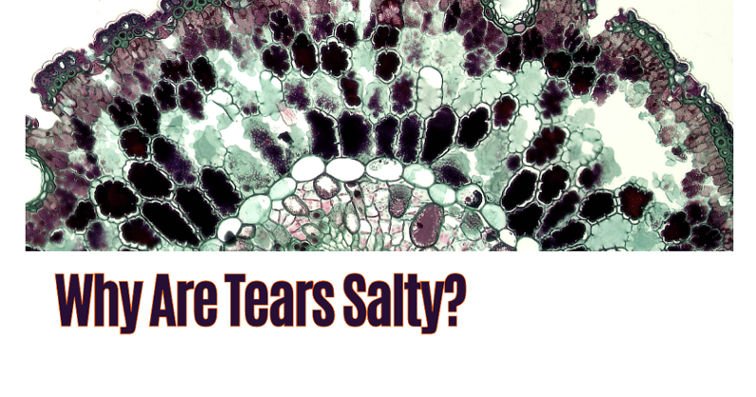Have you ever cried so hard your tears tasted salty? You’re not alone! Tears, despite their emotional connection, are actually a complex biological solution with a very specific purpose. But why are tears salty, anyway?
This blog post will delve into the fascinating science behind our salty tears. We’ll explore what tears are made of, why they have salt, and even answer some frequently asked questions about tears.
So, grab a tissue (you might need it!), and let’s get tearful!
The Science Behind Tears: More Than Just Waterworks
Tears aren’t just a sign of sadness. They play a crucial role in keeping our eyes healthy and functioning properly. Our eyes constantly produce tears, even when we’re not crying. These tears, called basal tears, lubricate our eyes, wash away dust and debris, and fight off bacteria.
When we cry, however, a different type of tear comes into play. These are called emotional tears, and they are produced by the lacrimal gland, located above each eye. Emotional tears are more abundant than basal tears and contain additional components to help us cope with emotional situations.
Unveiling the Salty Secret: What’s Inside Tears?
Tears are mostly water, but they also contain a surprising mix of other substances:
- Electrolytes: These are salts, like sodium and chloride, that help maintain the electrical balance in our bodies. They’re the reason tears taste salty!
- Proteins: These help lubricate the eye and fight infection.
- Oils: These help keep the tear film stable and prevent evaporation.
- Lysozyme: This enzyme has antibacterial properties and helps protect the eye from infection.
Here’s a handy table to break down the components of tears:
| Component | Function |
|---|---|
| Water | Makes up about 98% of tears, keeps the eye lubricated |
| Electrolytes (Sodium & Chloride) | Maintain electrical balance, give tears their salty taste |
| Proteins (like lysozyme) | Lubricate the eye, fight infection |
| Oils | Keep the tear film stable, prevent evaporation |
Why the Salt? Unveiling the Importance of Electrolytes in Tears
So, we know tears contain electrolytes, which are salts, and that’s why they taste salty. But why are these salts there in the first place?
Electrolytes play a vital role in several key functions:
- Maintaining fluid balance: Electrolytes help regulate the amount of water in our bodies, including our eyes. This ensures proper tear production and lubrication.
- Sending nerve signals: Electrolytes are essential for transmitting messages between nerves and muscles. This includes the muscles that control blinking, which helps spread tears across the eye.
- Supporting eye health: Electrolytes may also help protect the cornea, the clear outer layer of the eye.
In short, the salt in tears is there for a reason! It helps keep our eyes healthy, functioning smoothly, and responding effectively to different stimuli.
Delving Deeper: The Fascinating World of Tears
While we’ve explored the basics of salty tears, there’s still a lot to uncover! Let’s take a deeper dive into some interesting aspects of our emotional eye juice:
The Emotional Connection: Tears aren’t just a physical response. They’re deeply intertwined with our emotions. When we experience strong feelings, like sadness, grief, or joy, our bodies trigger the production of emotional tears. These tears may contain additional stress hormones, which some research suggests might have a calming effect.
The Cry Me a River Phenomenon: Not everyone cries the same amount. Tear production can vary depending on factors like genetics, hormones, and even personality. Some people well up easily, while others might seem to have a seemingly endless well of tears. There’s no “normal” amount of crying, and it’s perfectly okay to fall on different ends of the tear spectrum.
The Unsung Heroes: The Lacrimal Apparatus Tears wouldn’t exist without a dedicated production and drainage system. The lacrimal apparatus, a complex network of glands, ducts, and openings, plays a crucial role in tear production and removal. The lacrimal gland, located above each eye, produces tears. These tears flow across the eye and then drain through tiny openings in the eyelids into the lacrimal ducts, eventually reaching the nasal cavity.
Did You Know? Fun Facts About Tears

- Crocodile Tears: Although crocodiles appear to cry while eating, these are reflex tears to lubricate their eyes during feeding. They’re not shedding emotional tears!
- Crying it Out: Studies suggest that crying can have a cathartic effect, helping to release stress hormones and promote emotional well-being. So, sometimes, a good cry might be just what you need.
- Universal Language: Tears seem to be a universal language of emotion, understood across cultures. Even babies who are too young to understand language can often be soothed by the sight of a caregiver crying.
The Future of Tears: What’s Next?
Tear research is an ongoing field. Scientists are constantly learning more about the composition and function of tears. This research may lead to new treatments for dry eye syndrome, eye infections, and even emotional disorders.
Frequently Asked Questions About Tears (Salty and Otherwise!)
Now that we’ve explored the science behind salty tears, let’s answer some common questions:
- What does it mean if your tears are salty?
Having salty tears is completely normal! It simply means your body is maintaining a healthy balance of electrolytes in your tears.
- Are sad tears saltier than happy tears?
The composition of tears (including salt content) might differ slightly depending on the emotional trigger. However, the difference is likely very small and wouldn’t be noticeable by taste.
- Why do tears have a salty taste?
Tears taste salty because of the presence of electrolytes, particularly sodium chloride (table salt).
- Can my tears be too salty?
In very rare cases, a condition called Sjogren’s syndrome can cause tear production to be compromised. This can lead to more concentrated tears (including higher salt content) and irritate the eye. If you experience persistent eye irritation or changes in tear taste or consistency, consult a doctor.
Conclusion: A Salty Farewell (For Now)
Tears, though salty, are a fascinating and essential part of our eye health and emotional well-being. From lubricating our eyes to fighting infection and expressing our emotions, tears play a vital role in keeping us healthy and human.
So next time you cry, remember – it’s not just waterworks! It’s a complex biological process with a salty secret (and a very important purpose).

I’m a seasoned content creator with 6+ years of experience crafting engaging, SEO-optimized content that drives traffic and rankings. I excel in keyword research, link building, and guest posting, ensuring your brand reaches new heights.

